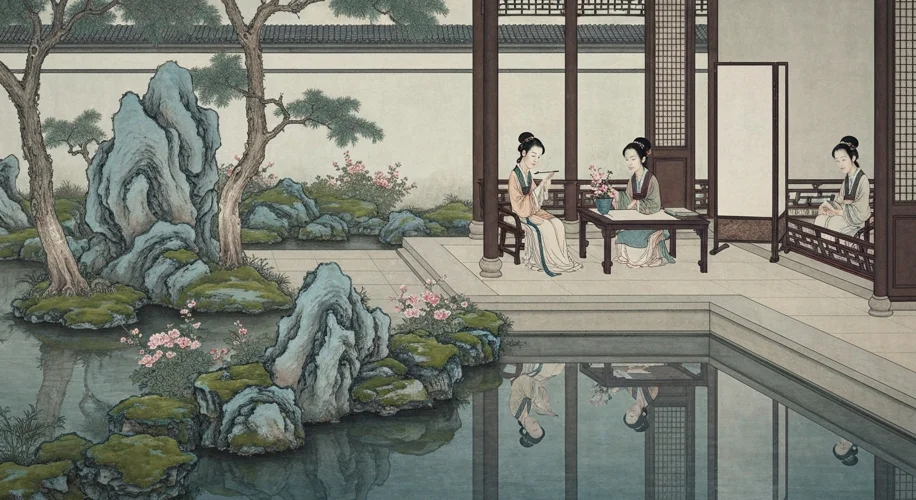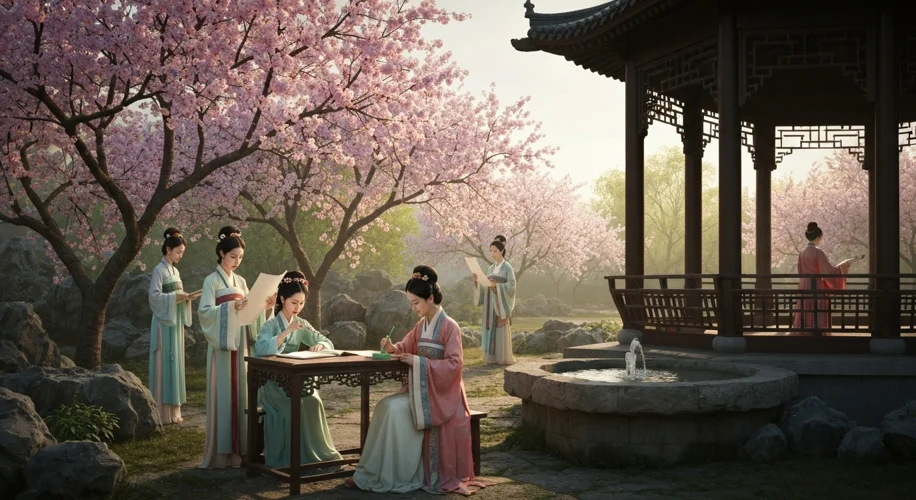The Song Dynasty (960–1279) in China is often lauded as a golden age of culture, innovation, and economic prosperity. Yet, beneath the glittering surface of advancements in art, science, and governance, a profound intellectual shift was taking place that would dramatically reshape the lives of Chinese women: the rise of Neo-Confucianism.
This wasn’t just a rehash of old ideas; Neo-Confucianism was a complex philosophical movement that reinterpreted the teachings of Confucius through a more metaphysical and systematic lens. Spearheaded by thinkers like Zhu Xi, it aimed to restore moral order and social harmony. While its proponents argued for a return to traditional values, the implications for women were far from simple. Instead of a universal uplift, the Song era witnessed a paradox: while some women, particularly in the elite classes, experienced subtle expansions of opportunity in certain areas, the dominant Neo-Confucian ideology increasingly emphasized patriarchal control and the rigid confinement of women to the domestic sphere.

The Re-emphasis on Patriarchy: The Three Obediences and Four Virtues
At the heart of Neo-Confucianism’s impact on women was the reinforcement of the “Three Obediences” (to father, husband, and son) and the “Four Virtues” (morality, proper speech, modest demeanor, and diligent work). These principles, though existing in earlier periods, were given renewed and more stringent emphasis. The ideal Neo-Confucian woman was to be pious, chaste, and subservient, her primary role confined to managing the household and bearing male heirs. Public life was deemed inappropriate, and women’s education, when it occurred, was often framed around domestic skills and moral cultivation rather than intellectual pursuits that might lead them astray.
This ideological shift manifested in concrete social practices. One of the most notorious was the widespread adoption and intensification of foot-binding. While it emerged earlier, Neo-Confucian emphasis on female chastity, delicacy, and confinement made small, “lotus” feet a symbol of status and feminine virtue. The excruciating process, often beginning in childhood, physically incapacitated women, further limiting their mobility and reinforcing their dependence on men.
Education: A Double-Edged Sword
Paradoxically, the Song Dynasty also saw an increase in literacy and education, and this extended, to a degree, to women. Elite families, particularly those seeking to maintain or elevate their social standing, recognized the value of educated daughters. A well-educated wife could assist her husband, tutor her children, and bring honor to the family through her cultured conversation and writings. Collections of women’s poetry and essays began to appear, offering glimpses into their private lives and intellectual capacities.
However, this education was largely instrumental. It was meant to serve the family and the patriarchal order, not to empower women for public life or independent thought. When women’s writings deviated from the expected moral and domestic themes, they often faced criticism or were dismissed as frivolous. The famed poet Li Qingzhao (1084–c. 1155), renowned for her lyrical talent and poignant verses, navigated this complex terrain. Her work often explored themes of love, nature, and personal loss, but also revealed a keen intellect and a spirit that chafed against societal constraints, especially after her husband’s death and her subsequent widowhood. Her resilience in preserving her husband’s collection of rare books and artifacts amidst turmoil, however, speaks to her strength and intellectual engagement.
Legal and Economic Status: Gradual Erosion
While women in earlier dynasties might have enjoyed slightly more legal and economic autonomy, Neo-Confucianism’s emphasis on family lineage and patrilineal inheritance led to a gradual erosion of women’s rights. Inheritance laws became more rigidly patrilineal, and women’s ability to control or inherit property diminished. Divorce became increasingly difficult for women to initiate, and their legal standing in public affairs was largely non-existent. They were represented by male guardians in legal matters, reinforcing their subordinate status.
Yet, even within these constraints, instances of female agency persisted. While not always challenging the system overtly, women found ways to exert influence within the family structure. They managed households, influenced children’s upbringing, and some even engaged in business or managed family estates, particularly widows. These were often quiet acts of resilience, carving out space for agency within a system designed to limit it.
Individual Stories: Navigating the Neo-Confucian Straitjacket
Consider the story of Zhu Shujie, a contemporary of the great Neo-Confucian philosopher Zhu Xi. While Zhu Xi championed a more austere and restrained vision of womanhood, Zhu Shujie, from an equally scholarly family, defied some of these norms. She was known for her intelligence and her literary talents, producing poetry that was appreciated for its skill and emotional depth. Her ability to engage in scholarly discourse with her male peers, albeit within carefully defined social boundaries, highlighted the intellectual potential that Neo-Confucianism sought to channel rather than suppress.
Conversely, the grim reality for many ordinary women was far from the salons of the literati. For them, Neo-Confucianism meant a life of unremitting domestic labor, strict social control, and the physical agony of bound feet. Their stories are often lost to history, overshadowed by the pronouncements of male scholars and the lives of elite women who left behind written records.
Legacy and Interpretation
The Neo-Confucian synthesis of the Song Dynasty cast a long shadow over Chinese society, profoundly shaping gender roles and women’s status for centuries. It created a complex legacy: on one hand, it fostered a particular ideal of refined womanhood and encouraged literacy within elite circles; on the other, it entrenched patriarchal authority, contributed to the physical subjugation of women through foot-binding, and severely limited their public and legal rights. The tension between the intellectual flourishing of the Song and the increasing social conservatism regarding women’s roles remains a crucial point of analysis for understanding the period and its lasting impact on gender dynamics in East Asian history.

